Adalah Justice Project’s Sumaya Awad interviews Manal Shqair, the International Outreach Coordinator for the Land Defense Coalition (LDC). The LDC was established in 2014 as an umbrella for grassroots movements in the occupied West Bank including organizations like The Palestine New Federation of Trade Unions (Arabic site here). Advocating for the rights of Palestinian workers in Israel and its illegal settlements is at the core of the LDC international outreach strategy.
Adalah Justice Project: Over 130,000 Palestinians (13% of the Palestinian workforce) from the West Bank work in Israel and/or in illegal settlements. Can you explain how this began and what sectors of industries primarily employ these workers?
Manal Shqair: A few years after Israel occupied the remainder of Palestine (the West Bank and the Gaza Strip in 1967), the Israeli labor market started to demand a Palestinian labor force. Before, Palestinians used to work within Israel (or as we refer to it, 1948 Palestine) because there were very few newly constructed illegal settlements in the West Bank. The fact that Israel started to depend on the workforce of the people it militarily occupied was part of a premeditated plan. In addition to making Israel’s capitalist enterprise flourish by exploiting Palestinians as cheap wage labor, the occupying power wanted to distance Palestinians from each other, and over time totally detach them from their lands. Once the Israeli labor market started to employ Palestinian workers, a large number of Palestinians began to work for Israeli corporations.
This is due to two main reasons: First, Palestinians at Israeli corporations receive higher salaries compared to wages in the West Bank. When we say that Palestinians are cheap wage labor, we mean in comparison to their Israeli counterparts, but not to Palestinians working in the Palestinian labor market. This is not the case for all Palestinian workers at Israeli corporations, but it is true for the large majority who are undocumented workers because they lack official work permits.
Second, the ability to access the Israeli labor market at the beginning of the 1970s coincided with Israel’s expansion further into Palestinian land and its take over of Palestinian natural resources for illegal settlers. This can be traced in the military orders that paved the way for the ongoing confiscation of Palestinians lands. For instance, in July 1967, the Israeli occupation issued military order No. 58 concerning absentee property. The order allowed Israel to take over the lands of Palestinians who were expelled from their homes during the 1967 war. Military order No. 59, issued on July 31, 1967 concerning state property was another order through which large swathes of unregistered lands were stripped from their Palestinian owners. Military orders No. 92 and 158, issued three days after the occupation of the West Bank and the Gaza Strip, allowed the Israelis to lay their hands on most of the water resources of Palestinians. This has had catastrophic consequences on the agricultural sector of Palestine, where many lost their sources of income. As a result these Palestinians had no choice but to work in Israel. On these confiscated lands, the Israeli occupation authorities built Jewish-only settlements within and around Palestinian towns and villages. The more lands Palestinians gradually lost, the more the Palestinian labor force depended on the Israeli labor market, either in settlements or within Israel. The 130,000+ Palestinians currently working in Israeli corporations are victims of Israel’s apartheid and land theft. The two biggest Israeli sectors employing Palestinian labor are construction and agriculture respectively. Other sectors that rely on Palestinian labor are the industrial sector and services, mainly cleaning.

Workers everywhere are exploited and oppressed, but Palestinian workers in Israel (specifically referencing non-citizen Palestinian workers) face a host of discriminatory tactics that are very particular to the colonizer-colonized structure and one that Israeli business owners use to obtain maximum exploitation. Can you talk about some of these intersecting factors that put Palestinian workers in incredibly precarious situations?
To be able to access work in Israel or in illegal settlements, Palestinians need Israeli permits. Theoretically, the applicant for a permit has to be married and to be able to pay the permit fees. In reality the Israeli occupation authorities reject many of the Palestinian workers applications for a permit under the pretext of “security reasons.” The Israeli occupation authorities trace the history of every Palestinian worker. Any involvement by the worker or a member of their family against Israel’s oppression, even if it is in the form of nonviolent actions, is considered to be a valid “security reason” to deny said Palestinian a permit. As of 2017, only about 67,000 Palestinian workers out of the more than 130,000 who work in Israel and its settlements have permits. The rest are undocumented.
Both those with and without permits encounter numerous forms of humiliation and danger when they commute to work. Holding a permit means workers have to wait for hours at Israeli military checkpoints. There, they get inspected through machines set up at the checkpoints. To humiliate Palestinians more, sometimes Israeli soldiers check them by forcing them to take off all of their clothes and be naked.
Palestinians who are smuggled in because they were refused a permit put their lives at risk by going to work through hatches in Israel’s Apartheid Wall. If they are caught, they are often shot by Israeli soldiers. Since January, 2021 two Palestinian workers have been murdered by Israeli soldiers while trying to get to work without permits. Other Palestinians who do not hold permits decide to sneak in through military checkpoints. They do so by paying Palestinians known among workers as ‘the brokers’ a certain amount of money to facilitate their smuggling through the checkpoints. The brokers do so by bribing Israeli soldiers at the checkpoints. This is another form of exploiting Palestinian workers because a portion of the money they pay to the brokers goes to Israeli soldiers. Moreover, these workers are subject to blackmailing by brokers who usually pressure them to pay more money to continue facilitating their smuggling.
At the workplace, Israeli employers exploit Palestinians in various ways. Palestinians are forced to work for long hours and are unfairly paid. By law, Palestinians should be paid as much as their Israeli counterparts. Yet Israeli employers pretend to comply with their legal system only theoretically by showing in their official records that Palestinian and Israeli workers are paid equally. When it comes to reality, Israeli employers evade the law by denying Palestinians some of the days they worked and cutting their wages based on that. For instance, if a Palestinian worker works 30 days a month, the Israeli employer denies them a full salary and pays them for only 10 or 15 days of work. Both Palestinians holding a permit and those classified as ‘illegal’ are subject to this form of ill-treatment. Many do not enjoy paid sick leave, holidays, or health insurance like their Israeli counterparts.
For documented workers, it is hard to protest their imposed exploitation because this will make it harder for them to get a new work permit. Regarding permit-less workers, it is very easy for their Israeli employers to fire them with no consequences if the workers decide to protest their dehumanizing conditions.
All this shows how the permit system is used as a disciplining tool to perpetuate the inferiority and exploitation of Palestinian workers at Israeli businesses.
Race and class intersect to systematically marginalize Palestinian men. However, Palestinian women workers are at the margins of the marginalized as race, gender, and class intersect to make their oppression tripled. There are over 6,000 Palestinian women working in Israel. They are subject to the same ill-treatment Palestinian men face, but they are are paid less than both the Israeli and Palestinian men. Palestinian women are sexually abused by Israelis and often by the Palestinian brokers they deal with. Some Israelis who employ Palestinian women as housemaids rape them. Most of these women stay passive and silent as they risk losing their jobs.

Israel’s union numbers are very high (compared to the U.S.), but by design Israeli unions haven’t, and in most cases still don’t, include Palestinian workers. In fact, only in the 1960’s were Palestinian citizens of Israel afforded the right to join unions and even then, they weren’t always given union services though they paid dues. Can you talk about this a little more?
About two decades after founding the Zionist Movement in the late 19th Century, the Histadrut, the first trade union organizing Jewish settlers in Palestine, was created in 1920. Since its inception, the Histadrut was in control of the mainstream Zionist efforts to colonize Palestine, including economic production, labor employment, marketing, and defense (mainly the Haganah.) The Histadrut disrupted early efforts by certain groups of Palestinian and Jewish workers for joint trade unionism. The Histadrut played a central role in the mass ethnic cleansing of two-thirds of the Palestinian population in 1948 when Israel was created. The Histadrut did so by carrying out Plan Dalet, a set of detailed dossiers that were employed to terrorize and erase the indigenous Palestinian population. Nowadays, the Histadrut is active in the colonization of the rest of Palestine by supporting illegal settlement expansion in the Occupied West Bank. It even supported the brutal Israeli attacks on Gaza and Lebanon.
The Histadrut practices apartheid against Palestinian workers at the micro-level. Although Palestinian workers pay membership fees, they cannot become full members simply because they are Palestinians. Nor does the Histadrut represent Palestinian workers’ concerns and interests as Palestinian workers have no voice to formulate the Histadrut and other Israeli trade unions’ policies. The Histadrut fully accepted the Israeli army’s criteria for distributing work permits, which, as said above, are used as a disciplining means to entrench the exploitation of Palestinian workers. The Histadrut also took part in funding the illegal settlements in the West Bank by helping the Israeli state to defraud Palestinian workers of $2 billion in welfare benefits.
Although other existing Israeli trade unions work towards unionizing Palestinian workers to demand their rights, none of them officially recognize Palestinians’ national aspirations and anti-colonial struggle. Worse than this, some of them pretend to treat both Israeli and Palestinian members equally. Yet, on the ground, they support Israelis who are directly involved in entrenching the settlement expansion project on Palestinian land. This, I think, is connected to the fact that they deny Palestinian national aspirations and do not recognize Palestinian exploitation at Israeli corporations as part of the colonial situation.
What Palestinian unions exist today? What are the main struggles they face?
There are about seven Palestinian trade unions that exist mainly in the West Bank, some of them have branches in Gaza. In addition to the Palestine New Federation of Trade Unions, or New Unions, which I affiliate with, the other trade unions are: The Palestinian General Federation of Trade Unions, The Palestinian General Federation of Trade Unions (the house of the people), Islamic Trade Unions, Independent Trade Unions, the Palestinian Postal Services Workers Union and the National Union of Palestine Workers.
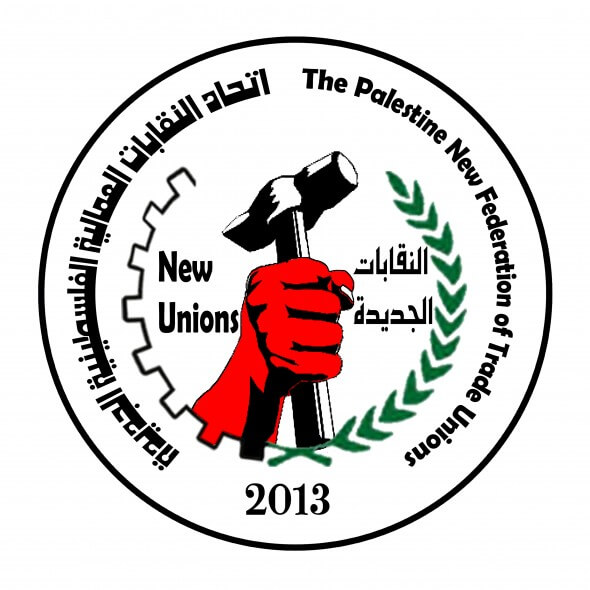
Most of these trade unions are affiliated with the existing political parties in Palestine. In other words, trade unions are a tool in the hands of political parties to co-opt people. Their affiliation with certain political parties has created division between trade unions and competition. This is reflected in the lack of support provided to workers in their struggle to be treated as humans in their work places in Israel.
The major struggle Palestinian trade unions face is related to the colonial and apartheid situation imposed on us. Palestinians face challenges in advocating for Palestinian workers as they are not recognized by the Israeli government. This affects the legal representation of Palestinian workers in court. However, the New Unions could overcome this obstacle by employing Palestinian lawyers holding Israeli citizenship to defend workers in courts. Another challenge is the Israeli ban on Palestinian trade union access to Palestinians at their workplace, either in Israel or in the illegal settlements, which restricts their ability to unionize workers. This does not mean that Palestinian trade unions do not unionize workers, but that they do so through a process that is more daunting when compared to Israeli trade unions who easily and freely access any Palestinian at work. Despite these obstacles, since it was created, the New Unions has succeeded in unionizing over 15,000 Palestinian workers at Israeli corporations.
Another dilemma Palestinian trade unions face is limited recognition by trade unions internationally. On the one hand, Israeli trade unions use their prestige, especially the Histadrut,to keep the Palestinian unions away from international recognition. On the other hand, some trade unions in the West and even individual journalists interested in highlighting what Palestinian workers encounter, tend to give more legitimacy to Israeli trade unions speaking on behalf of Palestinian workers. This shrinks the space for Palestinian trade unions to represent Palestinian workers and genuinely convey their voices. It also perpetuates what Palestinians have been fighting back against for decades: to be allowed to speak rather than being narrated and objectified in the stories told about them by their colonizers, Israeli trade unions included.
Can you tell us what Palestinian workers say about BDS and how they understand it as part of the strategy to pressure Israel (especially since it impacts their work)?
Palestinian workers conceive of BDS as a significant tool towards putting an end to their exploitation. I always hear some of them say, ‘the fact that we work for Israeli corporations and even take part in constructing buildings in Israeli settlements does not mean that we do not support BDS. We fully support BDS. The Israeli occupation and exploitation of our labor and our natural resources should be painful and costly. However, we are forced to work for Israelis due to the strangulation of our economy which leaves us choosing between starving or working for Israeli corporations. This is how we are forced to work there.’
Palestinian workers oppose the assumption that international support for the BDS movement might harm Palestinian workers who work for companies targeted by BDS. On the contrary: the dismantling of the Israeli settlement enterprise means that we Palestinians will be able to reclaim our land and natural resources. This, of course, will put an end to the exploitation of Palestinian workers by their Israeli employers. Any argument against this is an anti-worker argument.
How can unions in the U.S. build solidarity with Palestinian unions and workers’ organizations in Palestine in general?
At the core of supporting Palestinian trade unions in Palestine is fully adopting the call for BDS. This is because endorsing BDS links with our struggle on the ground against the exploitation of workers and the broader anti-colonial struggle. Adopting the BDS call is an act of embracing humanity as its call for the respect of human rights touches on people’s humanness. Part of building solidarity between U.S. and Palestinian trade unions is raising awareness and the mutual exchange of experiences of struggle against capitalism, especially by Black people and other oppressed minority groups in the US.
This article is part of the Mondoweiss series Redefining Liberation by the Adalah Justice Project on moving past the narrow definition of national struggle and embracing liberation strategies grounded in the rich Palestinian legacy of joint struggle and transnational solidarity. With strong connections to radical organizing happening in their Palestinian homeland, Adalah Justice Project‘s vision of transformation is rooted in the understanding that race, gender, sexual orientation, and class all intersect to create the conditions of our current reality. AJP is a Palestinian organization that works to transform public discourse and U.S. policy on Palestine through public education, coalition-building, and advocacy within all realms of political activity, from the grassroots to Capitol Hill. Learn more about AJP’s work, and follow the entire series here.
Sumaya Awad
Sumaya Awad is Adalah Justice Project’s Director of Strategy and Communications. Her forthcoming edited volume “Palestine: A Socialist Introduction” will be released in December 2020 by Haymarket Books.

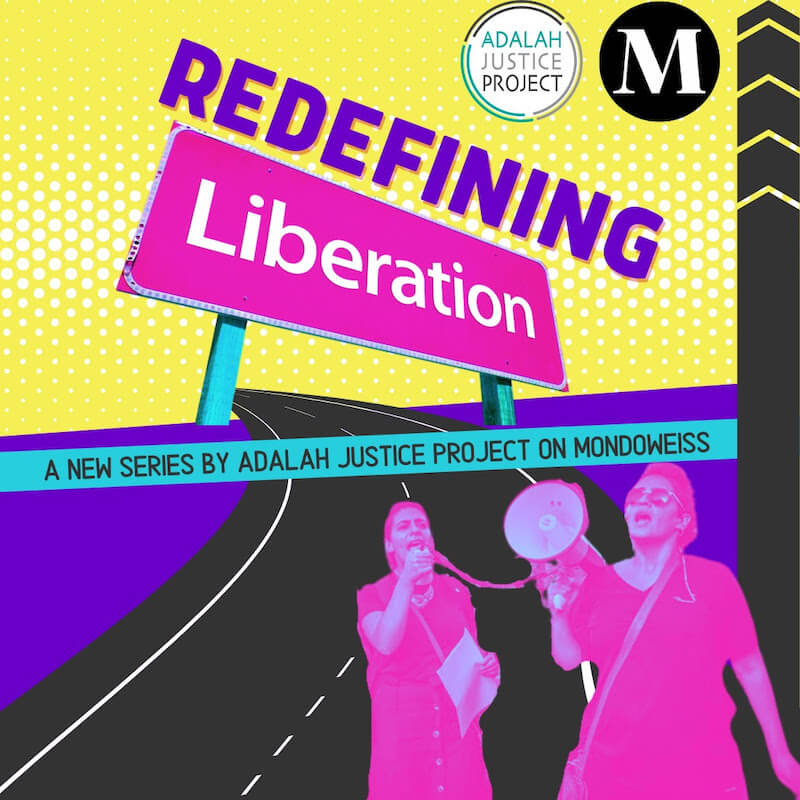
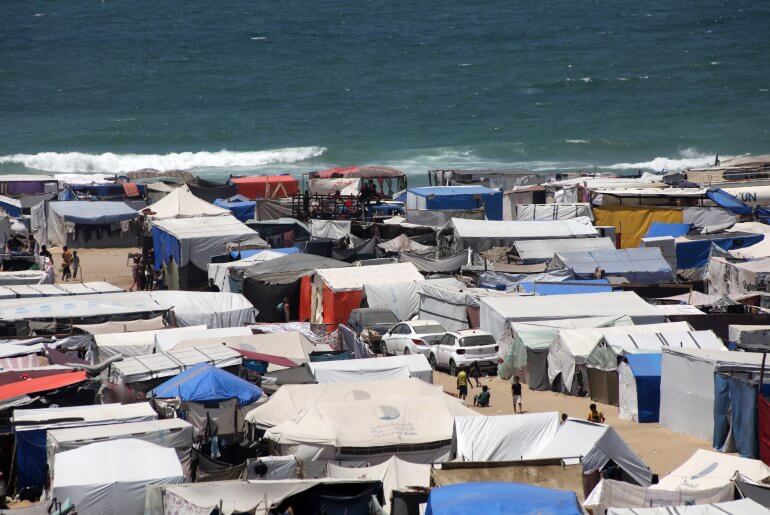
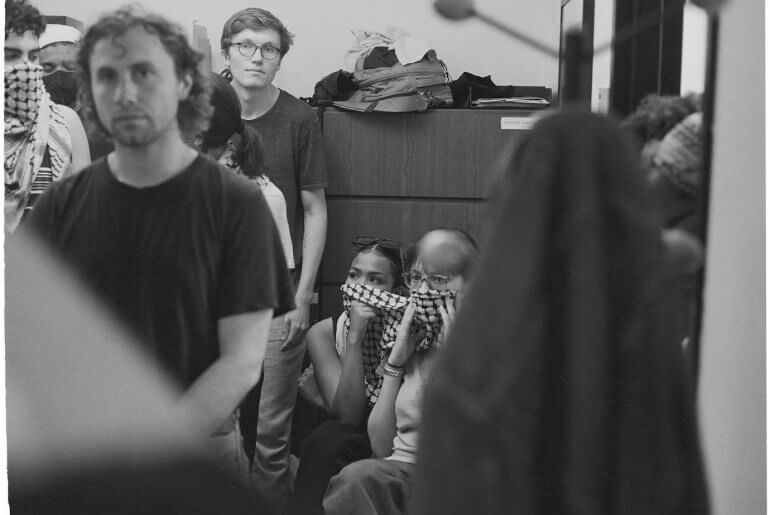
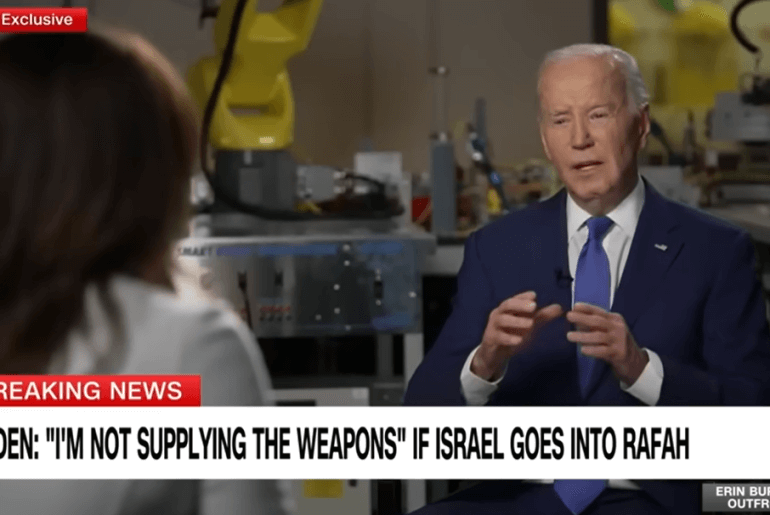
If we’re talking labor rights and economics, I think it’s relevant to point out that the Palestinians are a captive market for Israeli goods – the Palestinian economy, such as it is, is managed by Israel for its benefit –
https://www.newsweek.com/why-hard-west-bank-palestinians-boycott-israeli-goods-539953
Palestinian economist Raja Khalidi describes the West Bank as a “captive economy,” meaning Israel dominates all parts of it and “dumps” cheap products into the market. Under these conditions, Palestinians can’t be expected to take part in boycotts like those abroad, argues Khalidi, research coordinator at the Palestine Economic Policy Research Institute in Ramallah.
“Some Israelis who employ Palestinian women as housemaids rape them”. Does the writer happen to have any facts ? Exactly how many Israelis rape their Palestinian housemaids? OK, forget “exactly”, how about “approximately”?
“The Histadrut did so by carrying out Plan Dalet, a set of detailed dossiers that were employed to terrorize and erase the indigenous Palestinian population.” The Histadrut, not the Haganah?
” Palestinian workers have no voice to formulate the Histadrut and other Israeli trade unions’ policies“.-The policies and leadership of the Histadrut are determined by voting, in which all members are eligible to participate, regardless of nationality or religion.
In any case , it’s not clear to me whether the writer wants the Palestinian workers to join the Histadrut or would prefer that they join Palestinian unions.